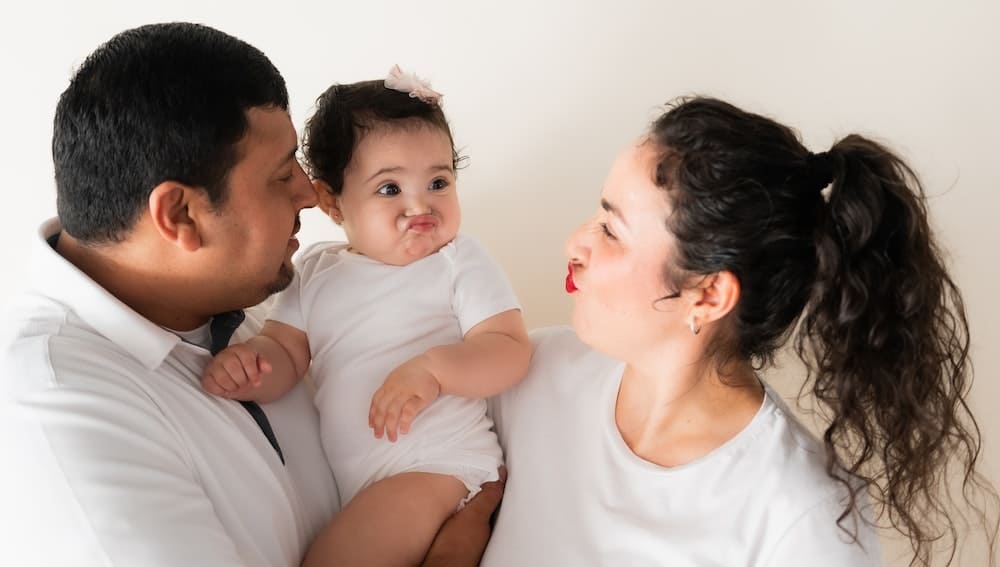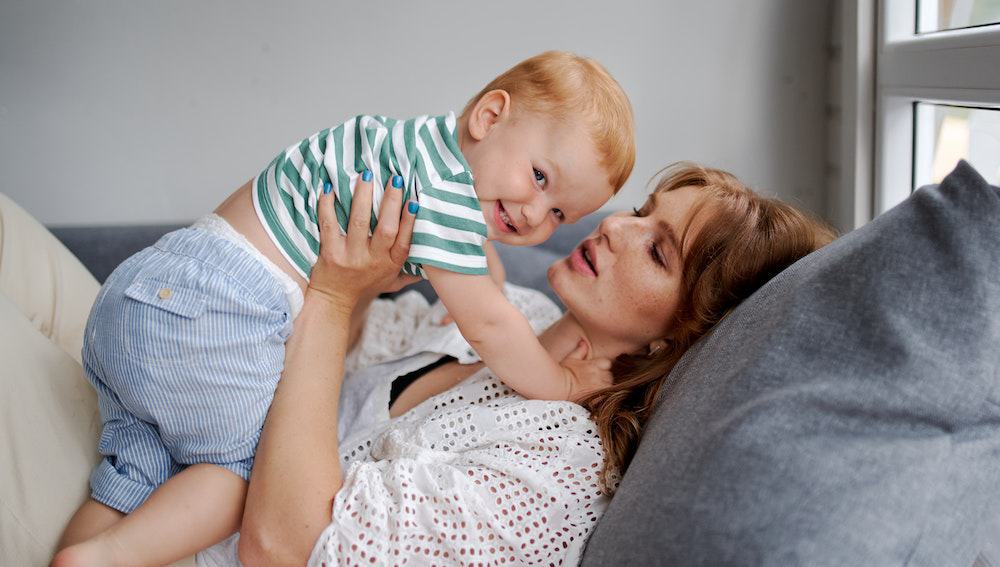Babies are known for their adorable cooing and gurgling sounds, but what about when they growl? Many parents have heard their little ones let out a low, guttural noise that sounds like a growl.
While it may seem strange or even concerning, growling is actually a normal part of a baby’s development.
Understanding Baby Sounds Babies communicate in many ways, including through sounds. From crying to laughing, each noise has a purpose and meaning. Growling is just one of the many sounds babies can make, and it often serves as a way for them to express themselves.
Babies and Communication As babies grow and develop, they begin to understand more about the world around them. They also learn how to communicate their needs and wants.
Growling is often a way for babies to express their frustration or displeasure, such as when they are hungry or tired. It can also be a sign of excitement or playfulness.
Key Takeaways
- Growling is a normal part of a baby’s development and communication.
- Babies use growling to express a range of emotions, from frustration to excitement.
- Parents can help their babies feel more comfortable by responding to their needs and providing comfort measures.
Understanding Baby Sounds
Babies make a variety of sounds to communicate with their caregivers and express their needs and emotions. Understanding baby sounds is an important part of language development and can help parents and caregivers respond appropriately to their baby’s needs.
Some common baby noises include babbling, grunts, growls, squeals, panting sounds, chuckles, sighs, and laughter. Each of these sounds can convey different meanings and emotions.
Babbling is a common sound that babies make as they begin to develop their language skills. Babbling typically involves repeating consonant and vowel sounds, and can sound like gibberish to adults. However, this is an important step in language development and helps babies learn to communicate.
Grunts and growls are often used by babies to express frustration or discomfort. These sounds can indicate that a baby is hungry, tired, or in need of a diaper change. Squealing is another common sound that babies make, often when they are excited or happy.
Panting sounds can indicate that a baby is overheated or feeling anxious. Chuckles and laughter are signs that a baby is happy and enjoying their environment. Sighs can indicate contentment or fatigue.
Baby sounds are an important part of communication and can help parents and caregivers understand their baby’s needs and emotions. By paying attention to the sounds that a baby makes, caregivers can respond appropriately and provide the care and attention that a baby needs to thrive.
Babies and Communication
Babies communicate in various ways, and growling is one of them. It is a sound that can indicate different emotions, needs, or discomfort.
Newborns use growling as a sign of discomfort or frustration when they are unable to express their needs or feelings. They may growl when they are hungry, tired, or uncomfortable. Parents can learn to recognize this sign of discomfort and attend to their baby’s needs promptly.
Growling can also be a sign of contentment or comfort. Babies may growl when they are happy or satisfied, especially during feeding or playtime. This sound can be a sign of a positive emotional state and can indicate that the baby is enjoying the moment.
Babies also use gestures and eye contact to communicate and interact socially. They may reach out for a hug or make other gestures to get attention or express their emotions. Parents can pay attention to their baby’s cues and respond with reassurance and comfort.
In summary, growling is one of the many ways that babies communicate. It can be a sign of discomfort, frustration, contentment, or pleasure. Parents can learn to recognize their baby’s cues and respond appropriately to their needs and emotions.
Babies and Digestion
Babies have a developing digestive system that can sometimes cause discomfort and lead to grunting or growling sounds. Understanding the basics of digestion can help parents recognize when their baby is experiencing digestive issues.
The digestive system is responsible for breaking down food and absorbing nutrients. In babies, the digestive system is still developing, and it can take time for their bodies to adjust to new foods and formulas.
As a result, babies may experience gas, constipation, or abdominal pressure.
Gas is a common issue for babies, and it can cause discomfort and restlessness. Babies may pass gas frequently, and this can lead to grunting or growling sounds.
Constipation is another common issue that can cause babies to strain and grunt during bowel movements. If a baby is constipated, it can be helpful to offer more fluids and foods that are high in fiber.
Grunting Baby Syndrome (GBS) is a term used to describe babies who make grunting or growling sounds while passing stool. This can be a sign of constipation or abdominal pressure. In some cases, GBS may be related to an immature pelvic floor or anal sphincter muscles.
If a baby is experiencing GBS, it is important to talk to a healthcare provider to rule out any underlying medical issues.
Acid reflux is another issue that can cause discomfort for babies. When stomach acid flows back into the esophagus, it can cause a burning sensation and lead to crying or fussiness. Babies with acid reflux may also make grunting or growling sounds, especially when lying down.
Anal stimulation can help babies pass stool more easily and reduce discomfort. Parents can gently massage the baby’s anus or use a rectal thermometer to stimulate the area. However, it is important to use caution and avoid overstimulating the area.
In summary, babies may growl or grunt due to digestive issues such as gas, constipation, or acid reflux. Grunting Baby Syndrome may also be a factor, and it is important to talk to a healthcare provider if a baby is experiencing persistent grunting or discomfort.
Anal stimulation can be helpful in some cases, but it is important to use caution and talk to a healthcare provider before trying any new techniques.
Babies and Sleep
Sleep is essential for a newborn’s growth and development. However, many parents find it challenging to understand their baby’s sleep patterns. One of the common concerns is newborn grunting during sleep.
During sleep, babies may make various noises, including grunting, snoring, and even breathing pauses. Some babies may also appear restless or have difficulty breathing. While these sounds and movements can be alarming to parents, they are usually normal and not a cause for concern.
Newborn grunting is often a result of the baby’s immature respiratory system. Babies are born with a closed voice box, which means they cannot breathe through their mouth. As a result, they may grunt or make other noises as they try to regulate their breathing.
Periodic breathing is also common in newborns. This is when a baby’s breathing pattern alternates between slow and shallow breathing and rapid and deep breathing.
While it may seem like the baby has stopped breathing during the shallow breathing phase, it is a normal part of the respiratory system’s development.
However, if a baby’s grunting or breathing difficulties persist or are accompanied by other symptoms such as fever or coughing, it may indicate a respiratory problem. In such cases, parents should seek medical attention immediately.
In conclusion, while newborn grunting and other sleep noises may be concerning for parents, it is usually a normal part of a baby’s respiratory system’s development.
However, if parents notice any persistent breathing difficulties or other concerning symptoms, they should seek medical attention promptly.
Also, read: My Baby Won’t Wake Up But She Is Breathing
Babies and Play
Play is an essential part of a baby’s development, and it can take many forms, from peek-a-boo to hide-and-seek.
Babies love to play, and it’s an important way for them to learn about the world around them. Playtime is also an opportunity for babies to bond with their parents and caregivers.
During playtime, babies often make growling sounds, which can be interpreted as a sign of excitement and playfulness.
Babies may growl when they are playing with toys, interacting with other babies, or even when they are alone. This behavior is entirely normal and should not be a cause for concern.
Babies may also growl as a way of expressing their sense of humor. They may find it amusing to make funny noises or imitate animal sounds. This behavior is a sign that babies are developing a sense of humor and are beginning to understand what is funny.
Playtime is also an opportunity for babies to express their love for their parents and caregivers. Babies may growl, coo, or babble as a way of showing affection.
This behavior is a sign that babies are developing a strong emotional bond with their caregivers, which is essential for their overall well-being.
In conclusion, play is an essential part of a baby’s development, and growling is a normal and healthy behavior during playtime. It’s an opportunity for babies to express their excitement, sense of humor, and love for their caregivers.
Parents and caregivers should encourage playtime and enjoy the precious moments of bonding with their little ones.
Babies and Discomfort
Babies growl for various reasons, and one of the most common reasons is discomfort. When babies are uncomfortable, they may growl, fuss, or cry to let their caregivers know that something is wrong.
Here are some of the common causes of discomfort in babies:
- Diaper rash: Diaper rash is a common problem in babies, and it can cause discomfort and irritation. When babies have diaper rash, they may growl or cry when their diaper is changed or when they are touched in the affected area.
- Teething: Teething can be a painful process for babies, and it can cause discomfort in their gums. When babies are teething, they may growl or cry more than usual, and they may also drool and chew on objects to relieve the pain.
- Fever: Fever is a sign that the body is fighting an infection, and it can cause discomfort in babies. When babies have a fever, they may growl or cry more than usual, and they may also feel warm to the touch.
It is important for caregivers to be aware of the signs of discomfort in babies and to take steps to address the underlying cause. For example, if a baby has diaper rash, caregivers can use diaper cream and change the baby’s diaper more frequently to help alleviate the discomfort.
If a baby is teething, caregivers can provide teething toys or a cold washcloth to help soothe the gums. If a baby has a fever, caregivers should consult with a healthcare provider to determine the best course of treatment.
In conclusion, discomfort is a common cause of growling in babies. By being attentive to the signs of discomfort and taking steps to address the underlying cause, caregivers can help keep their babies happy and healthy.
Understanding Baby Growling
Babies are known to make a variety of sounds, including cooing, crying, and babbling. However, some babies also growl, which can be surprising and even concerning for some parents. In this section, we will explore the reasons why babies growl and what it means.
What is Baby Growling?
Baby growling is a vocalization that sounds like a low-pitched, guttural noise. It is often described as a growl or a snarl and can be mistaken for aggression. However, baby growling is typically harmless and is a normal part of a baby’s development.
Why Do Babies Growl?
There are several reasons why babies growl. One of the most common reasons is that it is a way for babies to explore their vocal abilities. Growling allows babies to experiment with different sounds and pitches, which helps them learn how to control their voice.
Another reason why babies growl is that it can be a way for them to express their emotions. Growling can be a sign of frustration, excitement, or even happiness.
It is important for parents to pay attention to the context in which their baby is growling to understand what emotions they may be expressing.
Is Baby Growling Aggressive?
While baby growling can sound aggressive, it is typically not a sign of aggression. Babies do not have the cognitive ability to be intentionally aggressive, and growling is usually a harmless form of vocalization.
However, if a baby is growling in combination with other signs of aggression, such as hitting or biting, it may be a sign that they are frustrated or upset.
Conclusion
In conclusion, baby growling is a normal part of a baby’s development and is typically harmless. It is a way for babies to explore their vocal abilities and express their emotions. While it can sound aggressive, it is usually not a sign of aggression.
Parents should pay attention to the context in which their baby is growling to understand what emotions they may be expressing.
Babies and Food
Babies growl for a variety of reasons, including hunger. As babies grow, they require more food to fuel their developing bodies and brains. Breast milk or formula provides the necessary nutrients for a baby’s growth and development, but as they begin to eat solid foods, their appetite may increase.
It’s important for parents to pay attention to their baby’s hunger cues, which can include fussiness, rooting, and smacking their lips.
Offering small, frequent meals throughout the day can help keep a baby satisfied and prevent them from becoming overly hungry, which can lead to crankiness and excessive growling.
Introducing a variety of healthy foods to a baby’s diet can also help keep them satisfied and promote healthy growth. Foods high in protein, such as pureed meats or beans, can help keep a baby feeling full for longer periods of time.
Fruits and vegetables provide essential vitamins and minerals, while whole grains offer fiber to help regulate digestion.
In addition to providing nourishment, feeding time can also be an opportunity for bonding between a parent and baby. Holding a baby close, making eye contact, and talking or singing to them can help create a positive association with mealtime and promote healthy eating habits as they grow older.
Babies and Health Concerns
While growling is a typical behavior for babies, there are some health concerns that parents should be aware of. It is important to note that if a baby is growling excessively or in a way that seems unusual, it is recommended to seek advice from a pediatrician or doctor.
One potential health concern is autism. While growling alone is not a sign of autism, it can be a part of a larger pattern of behavior that may indicate autism. Other signs to look out for include delayed speech development, lack of eye contact, and repetitive behaviors.
Another health concern is asthma. Growling can be a sign of respiratory distress, which is a common symptom of asthma. If a baby is growling and also experiencing wheezing, coughing, or difficulty breathing, it is important to seek medical attention right away.
It is also important to note that excessive growling can be a sign of discomfort or pain. If a baby is growling frequently and appears to be in discomfort, it is recommended to consult with a healthcare provider to rule out any underlying medical conditions.
In summary, while growling is a common behavior for babies, it is important to be aware of potential health concerns that may be associated with excessive or unusual growling.
If a parent has any concerns about their baby’s behavior, they should consult with a pediatrician or doctor for guidance.
Babies and Development
Babies are constantly growing and developing, and this includes their language abilities. From the moment they are born, babies are already capable of making a variety of sounds, including growling. But why do babies growl?
One reason babies growl is because it is a natural part of their language development. As they learn to control their vocal cords, they experiment with different sounds and pitches.
Growling is just one of the many sounds that babies may make as they explore their vocal abilities.
Another reason babies growl is because it can be a way for them to communicate. While they may not be able to speak words yet, growling can convey a range of emotions, from excitement to frustration.
It can also be a way for babies to get attention from their caregivers.
It is important to note that growling is just one of many developmental milestones that babies will reach as they grow and learn. As they continue to develop their language skills, they will begin to use words to communicate and express themselves.
Overall, while growling may seem like a strange behavior for babies, it is a normal part of their development. As they continue to grow and learn, they will continue to make new sounds and reach new milestones in their language development journey.
Remedies and Comfort Measures
When a baby growls, it can be quite alarming for parents, but it is usually a normal behavior. However, if the growling seems excessive or is accompanied by other concerning symptoms, it is important to consult a pediatrician to rule out any underlying medical conditions.
To provide comfort and reassurance to a growling baby, there are several remedies and measures that parents can take. These include:
- Holding and cuddling: Babies thrive on physical touch and holding a growling baby close can provide comfort and reassurance.
- Baby massage: Gentle massage can help soothe a fussy or growling baby. Parents can use a natural oil, such as coconut or olive oil, to massage the baby’s back, legs, and arms in a circular motion.
- White noise: White noise, such as the sound of a fan or a white noise machine, can help calm a growling baby and provide a soothing background noise.
- Swaddling: Swaddling a baby can provide a sense of security and comfort, and may help calm a growling baby.
- Feeding: Hunger can be a common cause of fussiness and growling in babies. Ensuring that the baby is well-fed and comfortable during feedings can help prevent growling.
It is important to remember that growling is usually a normal behavior in babies and does not necessarily indicate a problem. By providing comfort and reassurance, parents can help their growling baby feel calm and secure.
Also, check out Gripe Water and Gas Drops a guide to soothing your baby’s colic.
Frequently Asked Questions
What causes babies to make growling sounds?
Babies make growling sounds when they are trying to communicate or express themselves. They may also growl as a way of exploring their vocal abilities and experimenting with different sounds.
Is growling a normal behavior for babies?
Yes, growling is a normal behavior for babies. It is a part of their natural development and is often a sign of their growing communication skills.
Do babies growl as a sign of autism?
There is no evidence to suggest that growling is a sign of autism in babies. However, if you are concerned about your baby’s development, it is important to speak with a healthcare professional.
Why do some babies growl instead of babbling?
Some babies may growl instead of babbling because they are still developing their communication skills. Growling is often an early vocalization and can be a sign that a baby is starting to explore their voice.
Why do babies growl more at night?
Babies may growl more at night because they are more active and alert during the day. As they settle down to sleep, they may become more vocal and expressive.
When should I be concerned about my baby’s growling?
If your baby’s growling is accompanied by other symptoms, such as difficulty breathing or feeding, it is important to speak with a healthcare professional. Additionally, if you have concerns about your baby’s development, it is important to seek guidance from a healthcare professional.
Learn more from a similar post: Baby Moans While Nursing

Iesha is a loving mother of 2 beautiful children. She’s an active parent who enjoys indoor and outdoor adventures with her family. Her mission is to share practical and realistic parenting advice to help the parenting community becoming stronger.




